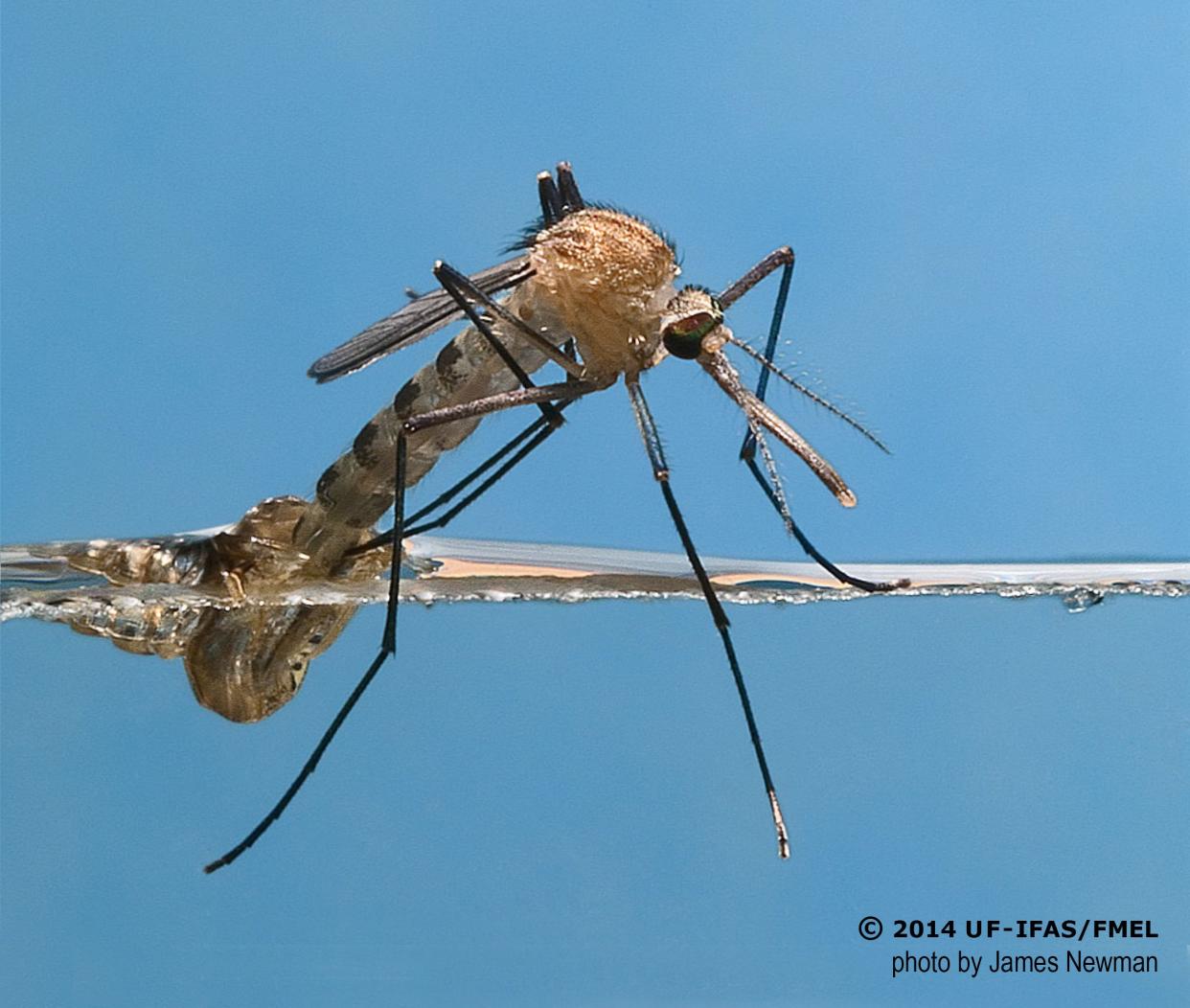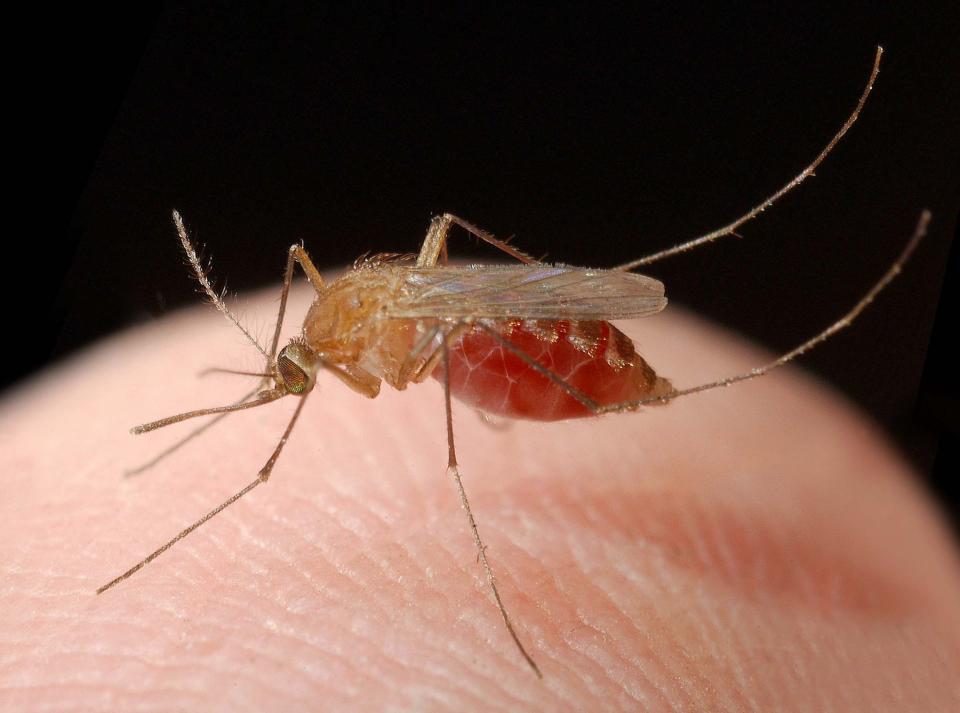West Nile virus risk hinges on mosquitoes that prefer city life over citrus fields

As Florida citrus trees fell to subdivisions, conditions on the ground grew ripe for a city mosquito that prefers nastier water and sewers over another that likes clean-water rural ditches.
As a result, entomologists say the St. Louis encephalitis virus, spread by the "cleaner" skeeter, went virtually extinct. Meanwhile, the "dirtier" pest that spreads West Nile encephalitis went more viral, especially in Florida's cities.
Add to that, recent bird movements along the coast and record heat this summer, and some scientists see a perfect storm of pestilence brewing. And they fear more West Nile outbreaks on par with what's happened in Texas cities in recent years.
This year, only three human cases of West Nile virus illness caught in Florida have been reported: two in Escambia County and one asymptomatic positive blood donor in Bay County. But meanwhile, 64 sentinel chickens and one horse have tested positive, which hints at trouble ahead.
"When you see numbers like that, it really catches your attention," Jonathan Day, professor emeritus at University of Florida's medical entomology lab in Vero Beach, said of St. Johns and Nassau counties in particular. Both have had 10 West Nile positive chickens.
As citrus and other Florida farmlands converted to subdivisions over the past few decades ― including those in Brevard and Indian River counties ― the more urbanized environments favored the Southern house mosquito over the St. Louis Encephalitis mosquito. Meanwhile, a Florida, ever-hotter and wetter from global warming, favors all mosquitoes.
"I think temperature has a lot to do with it. The hotter it is, the faster mosquitoes become infected," Day said. "We just came off of record worldwide temperature for the month of July."
More: Hurricane Idalia's deluge brings increased risk of mosquito-borne illnesses
The St. Louis encephalitis mosquito — which thrives along the ditches of citrus rows — also is likely involved in the transmission of eastern equine encephalitis virus in Florida, from Titusville north to Jacksonville and west to Pensacola, according to a UF writeup about the species.
Entomologists link that mosquito's more proliferous past and the St. Louis outbreaks it spreads to the the flooding patterns of citrus farming's heyday. The St. Louis outbreaks also tended to happen after hard freezes, Day said, such as the cold spells that wiped out much of the Indian River Lagoon's mangroves in 1989.
But there hasn't been as extreme a freeze in Florida since, and development and climate patters continue to favor the Southern house mosquito, which is also known to spread dengue fever and Zika virus. Between 2016 and 2040, if recent trends continue, 620,200 acres (7%) of Florida's farmland and ranchland will be paved over, fragmented, or converted to uses that jeopardize agriculture, according to American Farmland Trust, a farming advocacy group.
How dangerous is West Nile?
Most infected with West Nile virus don't get sick. About one in five develop a fever and other symptoms such as headache, pain and fatigue, according to the Florida Department of Health. Those with mild illness typically recover within a week with treatment.
Less than one-percent ― about 1 in 150 ― of infected people develop a serious, sometimes fatal illness. Symptoms typically appear between two and 14 days after the bite of an infected mosquito. "People over the age of 60 and individuals with weakened immune systems are at an increased risk for severe disease."
If not for COVID-19 in 2020, the West Nile outbreak in Miami-Dade might have been the big health news headline that year, Day said. By mid October 2020, there were 59 human cases of West Nile in Miami-Dade but no reported deaths.
"I think West Nile in Florida in coming years will look a lot more like Texas," Day said.
There were 42 cases of West Nile disease in Texas last year and 7 deaths, according to the Texas Department of State Health Services. Over the past five years, Texas has had 485 cases and 65 deaths. Mosquitoes remain active in much of Texas into November and December.
Scientists now expect more West Nile in cities, than widespread rural outbreaks. This week, the first human West Nile cases this year in New York — in New Rochelle in Westchester County — and in outside of Massachusetts popped up in urban areas.
But Day says, in a warming world, risk of mosquito-borne illnesses goes way beyond just West Nile.
"I believe that the warming of our planet may have a profound effect on worldwide disease transmission cycles," Day wrote in a recent weekly newsletter, in response to a Merritt Island reader's question about how the hottest July on record might affect disease transmission cycles.
The time from when a mosquito feeds on an infectious host until that mosquito becomes infective and can transmit the pathogen to other hosts is known as the extrinsic incubation period (EIP), Day explains. That period is temperature sensitive and, in general, the warmer, the faster the EIP is completed.
He points to a 2020 scientific review that summarized studies of EIP of dengue viruses. One study reported a nearly 10-fold decrease in the EIP time of mosquitoes held at 68 degrees Fahrenheit (56 days), versus those held at 86 degrees (six days).

Various mosquito species thrive on differing patterns and timing of wet and dry. Heavier rains of six inches or more can swamp out transmission of mosquito-borne illnesses. But in Northeast Florida, already a mosquito hotspot this summer, Hurricane Idalia's outer bands dumped less rain than that this week but enough for increased mosquito breeding.
The region also had experienced a dry period earlier in the summer that favored the amplification of West Nile virus, Day said. "I think it has a lot to do with where these viruses are getting amplified," he said of the disease risk.
And it's just a matter of time before the West Nile risk drifts to Brevard, he added.
More birds raise risk of West Nile
Birds help spread West Nile and other mosquito-borne illnesses, as well. Native blue jays are having a banner year, producing four broods of young this year, Day notes. "They've had a great year." So did cardinals, he said.
"The birds are critically important," Day added.
In a vicious viral cycle, mosquitoes carrying the virus spread it to birds when they bite them, or they feed on infected birds and pick up the virus and spread it to other birds and animals. Mosquitoes also pick up the virus in bird droppings. And predator birds get the virus from eating infected birds.
The second round of viral "amplification" comes with migratory birds, Day said. "The swallows are the very first. They are the very first ones that come through."
South Florida's wet year is favoring another type of mosquito that spreads dengue fever, which for now is mostly being brought to Florida from abroad. Twenty cases of dengue were reported the week that ended Aug. 26, in people who had had international travel. In 2023, 244 travel-associated dengue cases have been reported
"Cuba must have had a wicked outbreak over the last 16 months or so," Day said. "I think we've got a lot of odd things going."
According to Brevard County Mosquito Control, here are things you can do to avoid mosquito-borne illness:
Remove water-holding containers prior to the storm and drain rain water afterwards.
Make sure window screens are patched and in good repair. If power goes out and air conditioning cannot run, be prepared to safely keep windows open to let the fresh air in while keeping the mosquitoes out.
Keep pets up to date on heartworm medication. Keep horses current on EEE and WNV vaccinations, as recommended by veterinarians.
Reduce outdoor exposure at dusk and dawn when mosquitoes are most active. If outdoor activity is unavoidable when mosquitoes are present, apply EPA-approved repellants (according to product label instructions) and/or wear long sleeves and pants to reduce the chances of mosquito bites and disease transmission.
For information, visit Brevard Mosquito Control's site at www.brevardfl.gov/MosquitoControl
To learn about mosquito-borne viruses, the diseases they cause and the symptoms, visit Florida Department of Health's website here: www.floridahealth.gov/diseases-and-conditions/mosquito-borne-diseases/surveillance.html
Jim Waymer is an environment reporter at FLORIDA TODAY. Contact Waymer at 321-261-5903 or jwaymer@floridatoday.com. Or find him on Twitter: @JWayEnviro or on Facebook: www.facebook.com/jim.waymer
This article originally appeared on Florida Today: Florida West Nile virus risk grows in cities as citrus yields to homes

